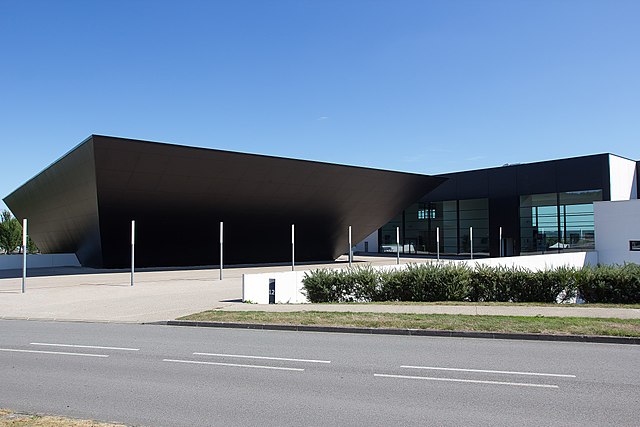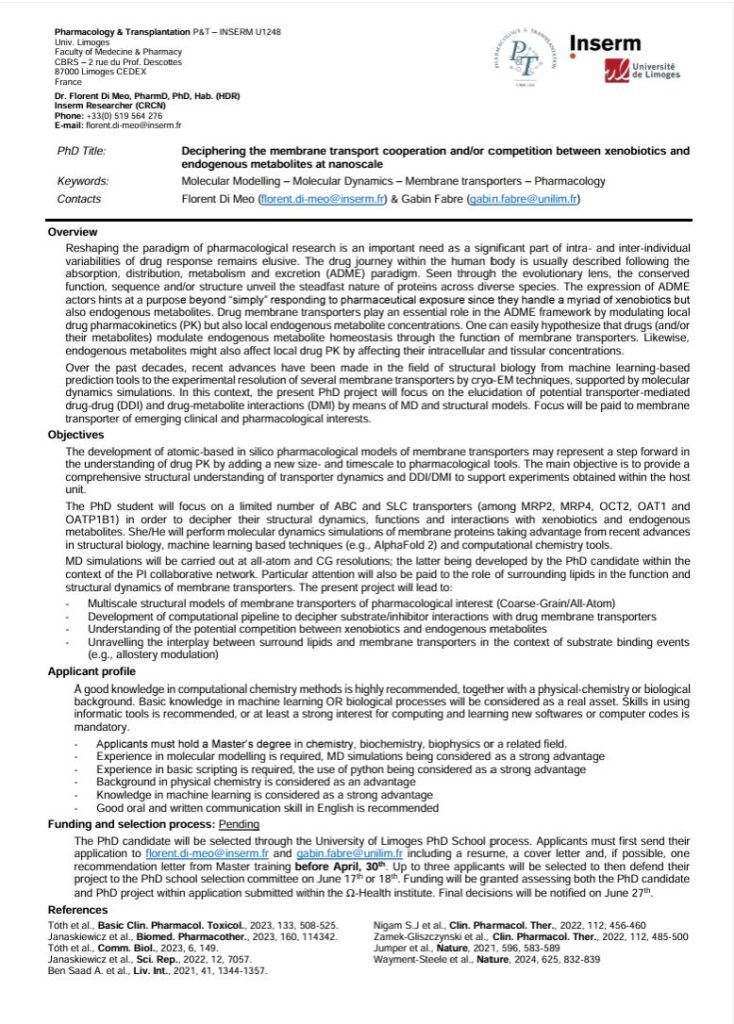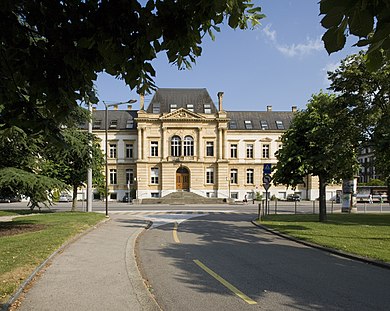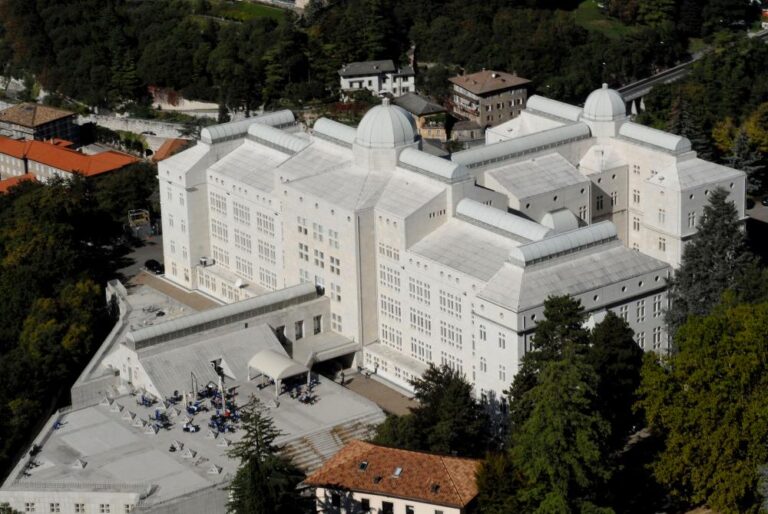Deciphering the membrane transport cooperation and/or competition between xenobiotics and endogenous metabolites at nanoscale
Keywords: Molecular Modelling – Molecular Dynamics – Membrane transporters – Pharmacology
Contact: Florent Di Meo (florent.di-meo@inserm.fr) & Gabin Fabre (gabin.fabre@unilim.fr)
Reshaping the paradigm of pharmacological research is an important need as a significant part of intra- and inter-individual variabilities of drug response remains elusive. The drug journey within the human body is usually described following the absorption, distribution, metabolism and excretion (ADME) paradigm. Seen through the evolutionary lens, the conserved function, sequence and/or structure unveil the steadfast nature of proteins across diverse species. The expression of ADME actors hints at a purpose beyond “simply” responding to pharmaceutical exposure since they handle a myriad of xenobiotics but also endogenous metabolites. Drug membrane transporters play an essential role in the ADME framework by modulating local drug pharmacokinetics (PK) but also local endogenous metabolite concentrations. One can easily hypothesize that drugs (and/or their metabolites) modulate endogenous metabolite homeostasis through the function of membrane transporters. Likewise, endogenous metabolites might also affect local drug PK by affecting their intracellular and tissular concentrations. Over the past decades, recent advances have been made in the field of structural biology from machine learning-based prediction tools to the experimental resolution of several membrane transporters by cryo-EM techniques, supported by molecular dynamics simulations. In this context, the present PhD project will focus on the elucidation of potential transporter-mediated drug-drug (DDI) and drug-metabolite interactions (DMI) by means of MD and structural models. Focus will be paid to membrane transporter of emerging clinical and pharmacological interests.
Objectives
The development of atomic-based in silico pharmacological models of membrane transporters may represent a step forward in the understanding of drug PK by adding a new size- and timescale to pharmacological tools. The main objective is to provide a comprehensive structural understanding of transporter dynamics and DDI/DMI to support experiments obtained within the host unit.
The PhD student will focus on a limited number of ABC and SLC transporters (among MRP2, MRP4, OCT2, OAT1 and OATP1B1) in order to decipher their structural dynamics, functions and interactions with xenobiotics and endogenous metabolites. She/He will perform molecular dynamics simulations of membrane proteins taking advantage from recent advances in structural biology, machine learning based techniques (e.g., AlphaFold 2) and computational chemistry tools.
MD simulations will be carried out at all-atom and CG resolutions; the latter being developed by the PhD candidate within the context of the Pl collaborative network. Particular attention will also be paid to the role of surrounding lipids in the function and structural dynamics of membrane transporters. The present project will lead to:
- Multiscale structural models of membrane transporters of pharmacological interest (Coarse-Grain/All-Atom)
- Development of computational pipeline to decipher substrate/inhibitor interactions with drug membrane transporters
- Understanding of the potential competition between xenobiotics and endogenous metabolites
- Unravelling the interplay between surround lipids and membrane transporters in the context of substrate binding events (e.g., allostery modulation)
Applicant profile
A good knowledge in computational chemistry methods is highly recommended, together with a physical-chemistry or biological background. Basic knowledge in machine learning OR biological processes will be considered as a real asset. Skills in using informatic tools is recommended, or at least a strong interest for computing and learning new softwares or computer codes is mandatory.
- Applicants must hold a Master’s degree in chemistry, biochemistry, biophysics or a related field.
- Experience in molecular modelling is required, MD simulations being considered as a strong advantage
- Experience in basic scripting is required, the use of python being considered as a strong advantage
- Background in physical chemistry is considered as an advantage
- Knowledge in machine learning is considered as a strong advantage
- Good oral and written communication skill in English is recommended
Funding and selection process: Pending
The PhD candidate will be selected through the University of Limoges PhD School process. Applicants must first send their application to florent.di-meo@inserm.fr and gabin.fabre@unilim.fr including a resume, a cover letter and, if possible, one recommendation letter from Master training before April, 30th. Up to three applicants will be selected to then defend their project to the PhD school selection committee on June 17th or 18th. Funding will be granted assessing both the PhD candidate and PhD project within application submitted within the 2-Health institute. Final decisions will be notified on June 27th.
*Following is the full advertisement image provided.
Feature photo credit: Wikipedia
If you have any inquiries or concerns about the content posted on our website, please do not hesitate to reach out to us via email (gradassistantship team).





